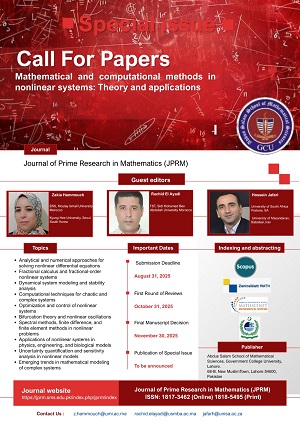Editorial Workflow
- Peer Review Model
JPRM operates a peer review system, ensuring that:
- Authors do not know the identity of the reviewers.
This approach is designed to promote objectivity and fairness in the evaluation process.
- Editorial Screening
Upon submission:
- The Editorial Board performs an initial screening to verify scope, format compliance, and plagiarism check (using standard tools).
- Manuscripts that do not meet minimum quality or ethical standards are desk-rejected without external review.
- Reviewer Selection
- Each manuscript is assigned to two independent expert reviewers with relevant expertise.
- Reviewers are selected based on academic credentials, publication record, and experience in the manuscript’s subject area.
- Reviewers must declare any potential conflict of interest before accepting the review.
- Review Criteria
Reviewers evaluate the manuscript based on:
- Originality and significance of the results.
- Mathematical correctness and rigor.
- Clarity of exposition and structure.
- Relevance to the aims and scope of the journal.
- Proper referencing and positioning within existing literature.
Each reviewer provides:
- A detailed report with comments.
- A recommendation: Accept / Minor Revision / Major Revision / Reject.
- Editorial Decision
- The Editorial Board makes the final decision based on reviewers’ feedback.
- In case of contradictory reviews, a third reviewer may be invited.
- Authors receive a compiled decision letter with anonymized reviewer comments and required revisions.
- Revisions & Re-Review
- Authors must submit revised manuscripts with a point-by-point response to reviewers’ comments.
- Revised submissions may be sent to the original reviewers for re-evaluation, depending on the extent of revision.
- Timeline
- Initial decision (acceptance for review or desk rejection): within 1–2 weeks.
- Full review process: 2–4 weeks on average.
- Confidentiality & Ethics
- All submissions and reviews are treated as confidential.
- The journal adheres to COPE (Committee on Publication Ethics) guidelines to handle cases of:
- Plagiarism
- Duplicate submission
- Authorship disputes
- Ethical misconduct
- Appeals and Complaints
- Authors may appeal decisions by writing to the Editor-in-Chief with a detailed justification.
- Appeals are reviewed by an independent editorial board member or an external expert.
- Reviewer Acknowledgment
- JPRM maintains a confidential database of active reviewers.
- Outstanding reviewers are acknowledged annually on the website (with consent).






